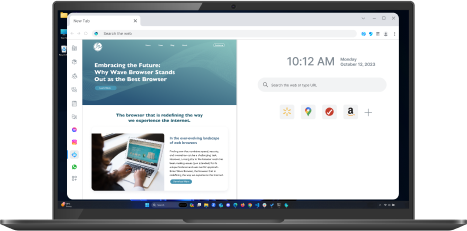Which Is The Best Search Engine For Privacy?
Table of Contents

If you care about your online privacy, using the right search engine is a smart move. Popular options like Google and Microsoft Bing track your searches and store your personal info, but privacy-focused search engines offer a safer, more anonymous way to browse, giving you a better overall search experience. These engines don’t track your searches or store your data, keeping your online activity private.
In this guide, we’ll take a look at some of the best search engine for privacy and how they help protect your information while you search the web.
What Is a Private Search Engine?
A private search engine is a web search engine that prioritizes your privacy by not tracking or collecting your personal data. Unlike traditional search tools like Google Search (Is Google spying on you?) or Bing, which gather information about your search queries, location, and online behavior to serve personalized ads and results, the best search engine for privacy is designed to keep your daily searches anonymous and secure.
These search engines typically do not store any search history or personal identifiers, ensuring that your browsing activity is not logged or shared. The goal is to provide you with the ability to navigate through web pages without leaving behind a trail of personal and search data that can be used for targeted advertising or sold to third parties.
How Do Search Engines Vary In Terms of Protecting User Privacy?
Search engines vary in how they protect user privacy, with differences in data collection, tracking, and storage practices.
Here’s how they generally differ:
Data Collection
"Kings of search" like Google and Bing Search Engine collect and store user data, such as browsing history, location, and device information. This data is used primarily for personalizing search results and serving targeted ads.
In contrast, privacy-focused search engines like DuckDuckGo, Startpage, and Qwant do not collect or store any personal data. They ensure that your searches remain anonymous and your information stays private, providing a safer browsing experience without any data retention.
Tracking
Traditional search engines often use cookies and other tracking technologies to follow users across websites. This allows them to build detailed profiles for targeted advertising. On the other hand, privacy-conscious search engines do not engage in this kind of tracking.
They avoid the use of cookies or technologies that track your activity across the web, meaning your browsing habits are not monitored or used for advertising purposes. This ensures a much more private online experience.
Search Results Personalization
Mainstream search engines personalize results based on your previous searches and profile, which can sometimes feel invasive. This personalization is driven by the data collected from your activity, such as your search history, clicks, and location.
Privacy-focused engines, however, do not personalize search results. Instead, they deliver the same results to every user, ensuring a neutral and unbiased experience. This can be a refreshing change if you prefer not to have your search results influenced by algorithms or your online behavior.
Encryption and Secure Connections
The best search engine for privacy prioritize encryption and secure connections to protect your data from being intercepted while browsing. These engines often use HTTPS by default, providing an added layer of security.
Standard search engines also use encryption, but because they store your data for various purposes, there’s a higher risk of exposure in the event of a data breach. Privacy engines ensure your search experience and activity are protected and cannot be subject to easy access by third parties.
Transparency
Private search engines are typically more transparent about their data usage policies. They make it clear that they do not track, store, or share any personal information. In contrast, mainstream search engines may not always be as forthcoming about how they use your data.
As a result, many users are left uncertain about how their information is being handled and shared, which can lead to concerns regarding privacy and security.
What Is The Best Search Engine for Privacy?
Many popular search engines collect and store personal data, leaving you vulnerable to tracking and targeted ads. However, there are privacy-focused search engines that are an excellent choice, allowing you to search the web without compromising your personal information. So, which alternative search engine is the best when it comes to privacy?
Let’s dive into a few of the top options that prioritize your security and anonymity.
1. DuckDuckGo

DuckDuckGo has become one of the best private search engines. It doesn’t track your searches, store any personal information, or create a profile based on your online activity. What makes DuckDuckGo unique is its simple, no-nonsense approach to privacy. It blocks third-party trackers and ensures that every search is private, giving you the peace of mind that your browsing habits aren’t being monitored.
2. Startpage

Startpage is another excellent option for private browsing experience. It serves Google's results but removes all tracking and personal data collection. This means you get the same powerful search results without compromising your privacy. Startpage doesn’t track or store your search history, and it even offers an anonymous browsing feature, adding an additional layer of security.
3. Qwant

Qwant is a European search engine that emphasizes privacy and neutrality. Unlike traditional search engines, Qwant doesn’t track your searches or create a personal data profile. It offers a clean interface and various features, such as news, social, and music, all while keeping your data secure. Qwant also provides a more diverse range of results, free from personalized ads and tracking, perfect for younger users.
Is Using a Private Search Engine Enough to Navigate Privately?
While using the best search engine for privacy is a good choice for keeping user information private, it’s not the only measure you should take to navigate the web privately. A private search engine helps by not tracking your search terms or collecting personal data, but there are other aspects of online activity that can still compromise your privacy.
Here's why using just a private search engine might not be enough:
- Tracking Across Websites: even with the best alternative search engines, your online activity can still be tracked by websites through cookies and other tracking mechanisms. Advertisers and websites can monitor your behavior across different sites, creating profiles based on your interactions to serve personalized search ads.
- IP Address and Location: your IP address can still reveal your general location and is visible to the websites you visit. Without additional privacy tools, your browsing habits may still be tied to your physical location.
- Third-Party Trackers: websites can still include third-party trackers, like social media widgets or analytics scripts, that monitor your movements across the web. Third-party cookies are commonly used by these trackers to store sensitive information and follow you across different sites, further compromising your privacy.
Additional Steps for Complete Privacy
To truly navigate the web privately, consider combining the best search engine for privacy with other privacy-enhancing tools:
- Use a VPN: a Virtual Private Network (VPN) masks your IP address and encrypts your internet connection, making it harder for anyone to track your online activity.
- Enable Browser Privacy Features: many browsers now include built-in privacy features, such as blocking third-party cookies, preventing tracking, and offering private browsing modes. Be sure to enable these settings to limit data collection.
- Use Ad and Tracker Blockers: ad-blocking extensions like uBlock Origin or Privacy Badger can block third-party trackers and prevent ads from following you across websites.
- Clear Cookies Regularly: cookies can store data about your browsing activity, so clearing them regularly can help keep your sessions more private.
- Be Cautious with Personal Information: avoid sharing too much personal information on websites, and be mindful of the data you give away when creating accounts or filling out forms.
While using a private search engine as your default search engine is an essential part of maintaining confidentiality, combining it with private browser and other security tools will offer you a much more comprehensive level of protection against tracking and data collection online.
Are There Any Downsides to Using a Privacy-Focused Search Engine?
While privacy-focused search engines, such as Brave Search, prioritize user data protection and comply with privacy laws like the EU privacy laws (e.g., GDPR), they may have some limitations compared to mainstream search engines like Google or Microsoft’s Bing. These search engines often rely on their own index of web pages or partner with other search providers, which may result in fewer or less comprehensive search results.
Because privacy engines do not track user data they provide a more unbiased search experience, but this also means they cannot offer the same level of personalized search results or targeted ads. Additionally, privacy engines focus on user anonymity and data security, which can limit the amount of data analysis used to refine search results and ads.
Ultimately, privacy-focused search engines offer a safer, more anonymous way to browse, but they do come with some trade-offs in terms of search accuracy and personalized content.
Surf with Ease, Speed, and Security!

Download Wave Browser for a seamless online experience like never before. Try it now!


























